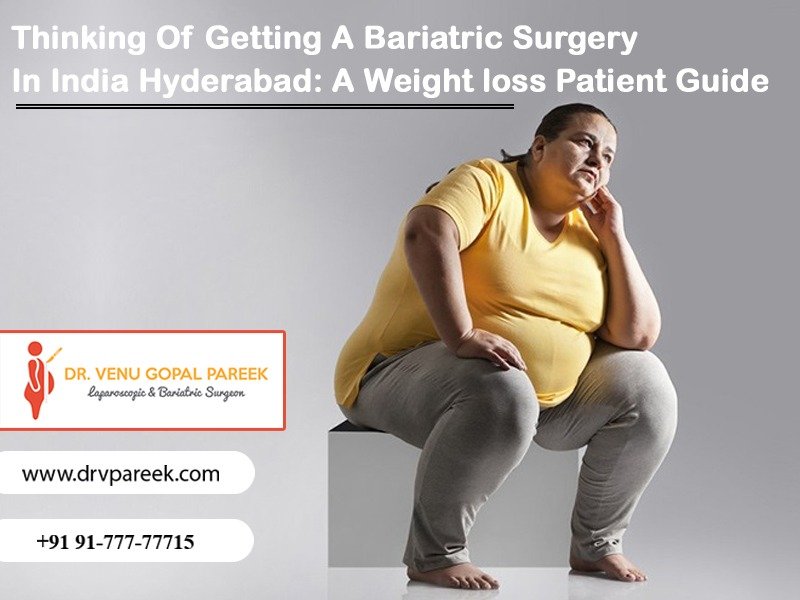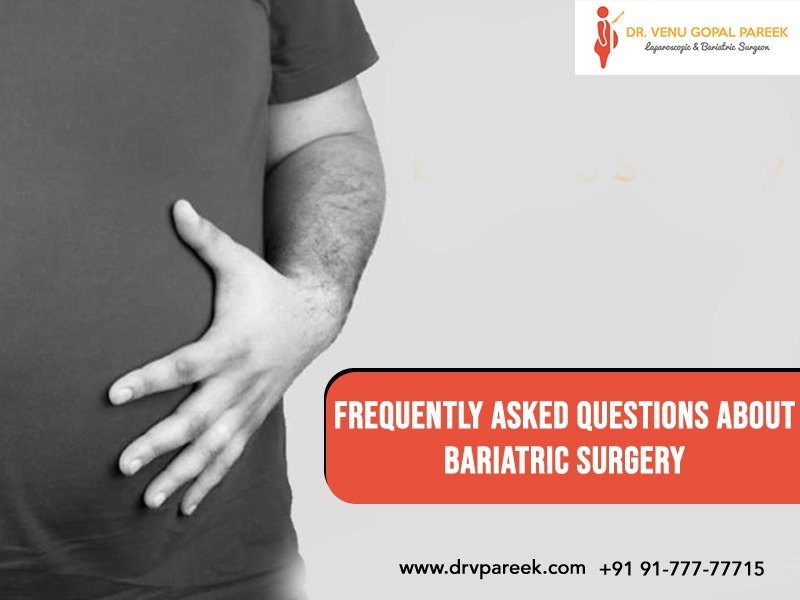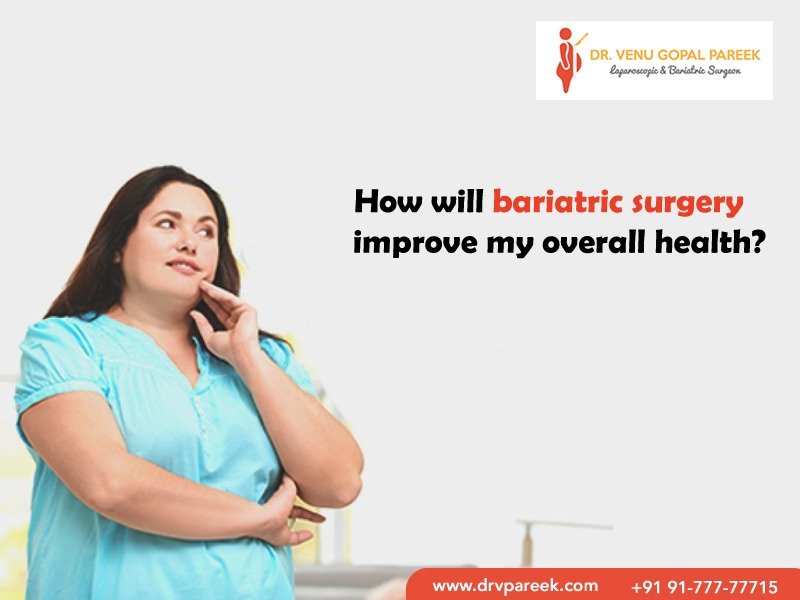
Thinking Of Getting A Bariatric Surgery In India Hyderabad: A Weight loss Patient Guide – Bariatric surgery
Thinking Of Getting A Bariatric Surgery in India Hyderabad?
Losing weight can be one of the toughest challenges one has to face. Our Bariatric surgeon Dr Venu Gopal Pareek is there for you in every step of the way to ensure that your weight loss is positive. His multidisciplinary team of nursing staff, nutritionists and psychologists, offer weight loss solutions tailored to your needs and goals and help you achieve long-term results. Over the years, his programs has provided patients with the support, knowledge and tools they need to lose weight safely and change a person’s life.
Bariatric surgery causes weight loss by limiting the amount of food the stomach can digest. Bariatric interventions also frequently cause hormonal changes. Most bariatric surgeries today are performed using minimally invasive techniques (laparoscopic surgery).
Let us see this article to know more about bariatric surgery and the most common type of bariatric surgeries.
What is Weight Loss Surgery?

Weight loss surgery consists of a group of operations that help you to lose weight by making changes to your digestive system. This is also known as bariatric surgery.
Some types of weight loss surgeries make your stomach smaller and limit how much you can eat and drink; simultaneously, you quickly feel full. Other weight-loss surgeries modify the small intestine hence reducing the food and drink intake. This operation reduces the number of calories that the body can absorb. Weight loss surgery can also affect hormones or bacteria in the digestive tract in ways that reduce appetite and hunger and increases how the body metabolizes fat and uses insulin.
This type of surgery is performed when the diet or exercise plan does not work, and when the person has severe health problems due to their weight. Gastric bypass surgery is the most common type of bariatric surgery, and most surgeons prefer this surgery because it usually has fewer complications than other weight-loss surgeries. This surgery usually involves significant risks and side effects. Patients must continually change their diet and plan a regular exercise program to ensure bariatric surgery’s continued success.
Who is best suited for surgery?
Bariatric surgery is a safe and effective method of treating people with painful obesity who cannot lose weight and maintain weight loss independently. You qualify if:
- You are 18 years or older
- If having a body mass index (BMI) equivalent to or over 40 or
- You have a BMI of 35 or more and one or more obesity-related conditions such as diabetes or sleep apnea.
Benefits of Weight Loss surgery

Although weight loss surgery is an effective way to achieve a healthier weight, other benefits of surgery include:
- Correcting or reversing some obesity-related conditions such as type 2 diabetes, high blood pressure, sleep apnea, and joint pain Improve health overall
- Improve your quality of life, including increased energy and mobility.
- Improve your circulation, mood, and mental health
Is Weight Loss Surgery Always Successful?
Studies show that many people who undergo weight loss surgery lose an average of 65 to 80 per cent of their original body weight, depending on the type of surgery. However, no method, including surgery, is sure to result in and maintain weight loss. Some people who undergo weight loss surgery may not lose as much as they hoped. Over time, some people regain some of the weight they lost. The amount of weight recovered may vary. Factors affecting weight recovery include a person’s preoperative weight, what type of surgery they have, and whether they change their exercise and diet.
Weight loss surgery not only helps in reducing your calorie intake but also be more physically active. Choosing healthy foods and drinks before and after surgery can help you lose weight and stop it in the long run. Regular exercise after surgery will also help maintain weight. To improve your health, you need to commit to a healthy lifestyle for the rest of your life and follow your health care professional’s advice.
Types of Bariatric Surgery in India Hyderabad
- Biliopancreatic diversion with duodenal switch (BPD/DS)
- Adjustable gastric band
- Gastric bypass (Roux-en-Y)
- Intragastric balloon
- Sleeve gastrectomy
Biliopancreatic diversion with duodenal switch (BPD/DS)

The Biliopancreatic Diversion with Duodenal Switch (BPD / DS) is a type of surgery for weight loss. It is also known as the duodenal switch. This type of bariatric surgery changes the size of the stomach and the length of the small intestine. This limits how much food you can eat, digest, and absorb.
The part of the stomach is closed with staples to form a smaller pouch. The rest of the stomach is removed. That little stomach limits the amount of food you can eat at one time. The small intestine (first part, or duodenum) is then divided. The minimal length of the last part of the small intestine is removed and attached to it (duodenum). This is the duodenal switch.
When you eat, food only enters through the new stomach sac to empty into the last part of the small intestine. It involves a large part of the small intestine, so less food is digested. You use fewer calories and nutrients. This can reduce weight drastically. The detached portion of the small intestine reconnects with the last part of the small intestine. This changes the usual way of bile, and digestive juices break down food. This is a biliopancreatic diversion .This will reduce the number of calories consumed and result in more significant weight loss.
Adjustable gastric band

In this type of surgery, the surgeon places a ring with an internal inflatable band around the abdomen’s top to form a small pouch. Like gastric sleeves and gastric bypass surgery, a gastric band will make you feel full after eating small amounts. The inner band has the inside of a round balloon filled with saline solution. The surgeon adjusts the inner band to change the pouch’s opening to the rest of the abdomen. This is achieved by injecting or dispensing a saline solution through a small instrument called a port placed under your skin.
After surgery, you will need several further tests to adjust the size of the band openings. If the band is causing problems or is not helping you lose weight, the surgeon can remove it.
Gastric bypass (Roux-en-Y)

Gastric bypass is otherwise known as Roux-en-Y gastric bypass. In this procedure, a
small abdominal sac is connected directly to the small intestine. So, once digested, food reaches the small intestine from the thin sac of the stomach without passing through most of the stomach and the initial part of the small intestine.
This procedure is the most widely used weight loss procedure globally and, like other weight-loss surgeries, is performed when a diet and exercise plan is not available to the patient.
Intragastric balloon

During this weight loss surgery, a silicone balloon filled with a salt solution is placed in the stomach. This helps patients lose weight as the amount of food eaten is limited. And even with small portions, a person feels full.
Sleeve Gastrectomy:

Sleeve gastrectomy is a weight-loss surgical procedure also known as vertical sleeve gastrectomy. This procedure removes about eighty per cent of the stomach. A small tubular belly that is about the size and shape of a banana is left behind. This procedure causes hormonal changes to help you lose weight. Apart from losing weight, this hormone also reduces high blood pressure or the typical heart disease associated with weight problems.
Mini Gastric Bypass/ One anastomosis bypass

Mini gastric bypass is a technically less complicated operation compared to the
Roux-en-Y gastric bypass. It has a more significant malabsorbent component than the previous procedures. Therefore, closer monitoring and vitamin and protein supplements are essential.
The above all surgeries are standard practices in India. Most of the patient profiles correspond to one of the operations mentioned above. It would help if you discussed in detail with your surgeon what is best for you.
How to Maintain your weight after Bariatric surgery?
The success of bariatric surgery is highly dependent on the behaviour and lifestyle changes the patient makes after surgery. Patients must strictly adhere to the diet plan and undergo behavioural therapy to change their diet and exercise attitudes.
Lifestyle changes after surgery

Do not start your exercise program immediately after surgery. Let your body heal and walk slowly. Low impact exercises are recommended for the first few months such as walking, swimming, simple yoga, stretching and breathing exercises. One can start a strength and cardio training only after consulting a doctor.
People who have had bariatric surgery should adhere to a strict, long-term diet and exercise plan to avoid complications and avoid gaining weight after surgery. The patient may also experience excessive sagging and wrinkled skin, which may require further surgery to lift and tighten it.
Life after bariatric surgery

A variety of conditions have been shown to improve or disappear after weight loss surgery, including asthma, sleep apnea, cardiovascular disease, type II diabetes, orthopaedic problems, migraines, and gastroesophageal reflux disease. Weight loss surgery can change a person’s life for the better and is sometimes the most effective option for many people dealing with obesity and obesity-related diseases.
Conclusion:
Dr Venu Gopal Pareek strives to help you lose weight and return to normal health. Also, he will continue to take care of your lost weight and fitness throughout your life so that you can live an active life full of energy and happiness and achieve your personal goals in life. This happens through a very dedicated follow-up, which helped us maintain a healthy lifestyle after surgery. Dr Venu Gopal Pareek has a team ready to help you overcome all those small obstacles.
To learn more or undergo surgery, visit Dr Venu Gopal Pareek by booking your consultation call at 091777 77715.







